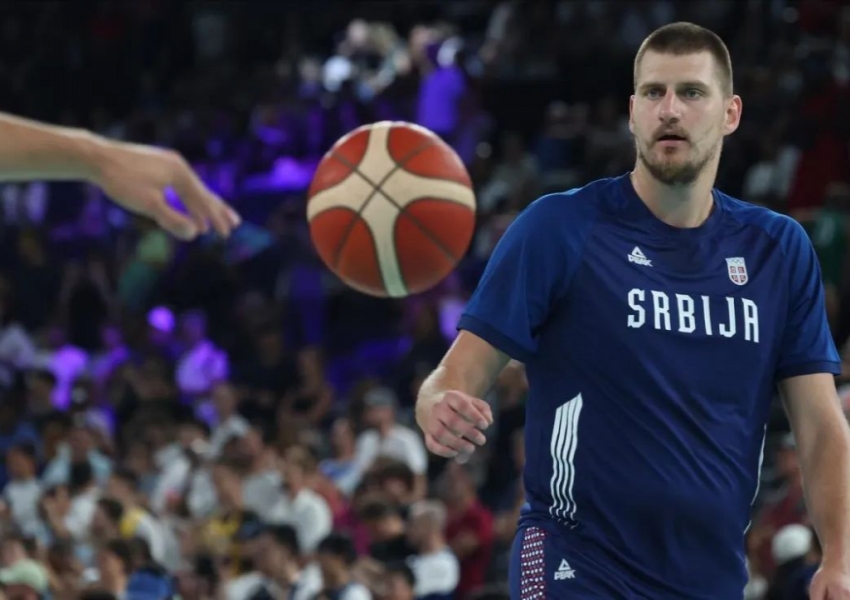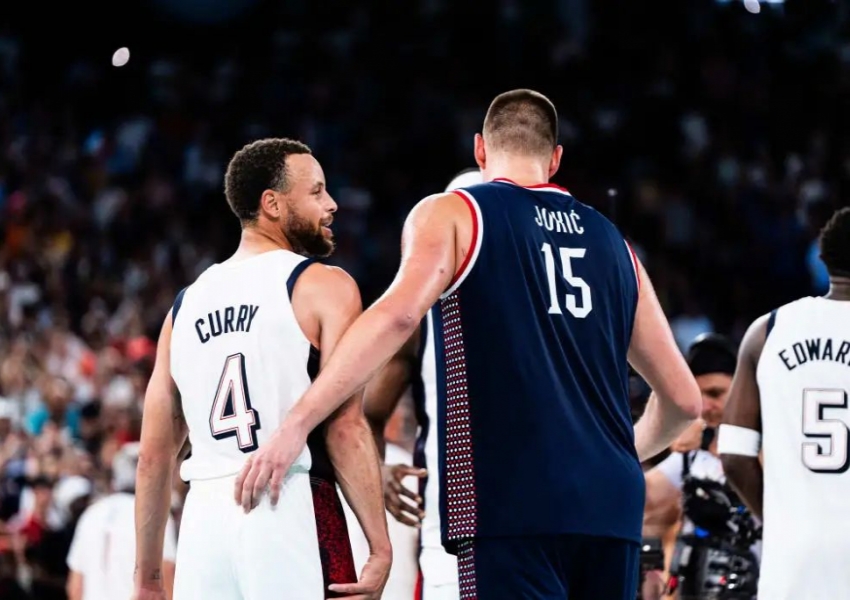A Class Above the Rest: How Dominant is Jokic at the Olympics?
The 2024 Olympic men’s basketball semifinal between Serbia and the United States was a game that will be remembered for years to come. Serbia led for three quarters and at one point enjoyed a 17-point advantage over the Americans. However, in a dramatic turn of events, Team USA mounted a comeback in the final minutes to secure a 95-91 victory, dashing Serbia’s hopes of reaching the gold medal game. Despite the heartbreaking loss, one thing was clear—Nikola Jokic, Serbia’s superstar, had done everything in his power to carry his team to victory.

Jokic’s performance in the semifinal was nothing short of remarkable. He finished the game with 17 points, 6 rebounds, 12 assists, and 1 block, showcasing his all-around game. His 12 assists were more than the combined total of all his teammates (11), and he committed just 2 turnovers, demonstrating his exceptional decision-making and court vision. Though he was the second-highest scorer on the team, it was his playmaking that stood out, as he continuously created scoring opportunities for his teammates.

This performance was not an isolated incident but rather the continuation of Jokic’s brilliant form throughout the tournament. In the group stage, Serbia had already faced Team USA once, suffering a 26-point defeat. However, in that game, Serbia was able to hold their own during the 31 minutes that Jokic was on the floor, with the score tied during his time on the court. The 26-point deficit came entirely in the 9 minutes Jokic was off the floor, underscoring just how crucial he is to his team’s success.

As expected, Serbia needed Jokic to be at his best to have a chance against the Americans in the semifinal, and he delivered. Jokic played all but 2 minutes and 10 seconds of the game, an impressive feat given that just two days earlier, he had logged 39 minutes in a grueling quarterfinal against Australia. Despite his heavy workload, Jokic continued to make an impact on both ends of the floor.
However, there were some areas where Jokic fell short. His shooting efficiency wasn’t up to his usual standards, as he made just 7 of his 17 field goal attempts, including going 0-for-6 from beyond the arc. Some of those misses were the result of tough, contested shots, but it’s worth noting that Jokic’s three-point shooting had been subpar throughout the tournament, hitting just 2 of 16 attempts. Additionally, Jokic picked up his fourth personal foul with 7 minutes remaining in the fourth quarter, a moment that proved to be a turning point. The Americans capitalized on this by scoring on a 3-point play and converting a subsequent free throw to cut the deficit from 11 points to just 5. Jokic, mindful of his foul trouble, was more conservative on both ends of the floor after that, which may have limited his effectiveness down the stretch.
Even so, Jokic continued to make critical plays when his team needed him most. He responded to a tough mid-range jumper from Kevin Durant with a clutch basket of his own, keeping Serbia within striking distance. More importantly, Jokic’s presence on the court allowed his teammates to thrive, particularly the Serbian perimeter players led by Bogdan Bogdanovic. Serbia connected on 15 three-pointers through the first three quarters, a key reason why they were able to build and maintain a lead for much of the game. Unfortunately, their shooting went cold in the fourth quarter, and Serbia failed to make a single three-pointer in the final period, ultimately leading to their downfall.
Looking at Jokic’s overall performance in the Olympics, it’s clear that he has been one of the most dominant players in the tournament. His numbers speak for themselves:
- Against the United States (group stage): 20 points, 5 rebounds, 8 assists, 4 steals
- Against Puerto Rico: 14 points, 15 rebounds, 9 assists, 2 steals
- Against South Sudan: 22 points, 13 rebounds, 4 assists
- Against Australia (quarterfinal): 21 points, 14 rebounds, 9 assists, 4 steals
- Against the United States (semifinal): 17 points, 5 rebounds, 11 assists
Across five games, Jokic has averaged 18.8 points, 10.4 rebounds, 8.2 assists, and 2.2 steals per game. He ranks sixth in scoring, first in rebounding, and first in assists, while shooting an outstanding 69.4% from inside the arc. Though his three-point shooting has been off, his efficiency from two-point range has been exceptional, making him a constant threat near the basket.
In addition to his traditional statistics, Jokic has also excelled in advanced metrics. According to FIBA’s efficiency rating (EFF), Jokic has accumulated an EFF of 150, with an average of 30.0 per game—both of which are the highest among all players in the tournament. To put that in perspective, Giannis Antetokounmpo, who ranks second, has an average EFF of 26.5, while LeBron James ranks fourth with 23.4. Jokic’s impact is even more pronounced when looking at the Real Adjusted Total (RAT) value, a more comprehensive advanced stat. After the semifinal, Jokic had a RAT of 39.39, which is not only the highest in the tournament but significantly ahead of second-place LeBron James (31.98). In fact, the gap between Jokic and James is larger than the gap between James and tenth-place Kevin Durant.
These advanced metrics illustrate just how dominant Jokic has been, both in comparison to his peers and in terms of his overall impact on the game. While advanced stats don’t tell the whole story, anyone who has watched Jokic play can attest to his importance to Serbia’s success. His combination of size, skill, basketball IQ, and unselfishness makes him a rare talent who can influence a game in so many different ways. Jokic’s ability to dominate in both the NBA and FIBA competitions is a testament to his versatility and adaptability, proving that his greatness transcends any specific system or set of rules.
Losing to Team USA in the semifinal is certainly disappointing, but there is no shame in falling to a team with such depth and talent. Serbia’s Olympic journey is not over yet, as they will now face Germany in the bronze medal game. This matchup carries added significance, as Serbia lost to Germany in the final of last year’s FIBA World Cup, finishing as the runner-up. Jokic did not participate in that tournament, as he was fresh off leading the Denver Nuggets to an NBA championship. This time, however, he will have the opportunity to help his team exact revenge and end the Olympics on a high note by securing a medal.
As the bronze medal game approaches, all eyes will once again be on Jokic. The world will be watching to see if he can continue to assert his dominance and lead Serbia to victory. Given his performances thus far, there is every reason to believe that Jokic will once again demonstrate why he is considered one of the best players in the world, if not the very best. His journey in these Olympics has been nothing short of extraordinary, and no matter the outcome of the final game, Jokic’s legacy as a basketball great has only been further cemented.
Copyright Statement:
Author: focusnba
Source: FocusNBA
The copyright of this article belongs to the author. Reproduction is not allowed without permission.
Recommended Blog
- Farewell to Jokic: 11 Assists, 0 Turnovers, and a Bronze Medal – The Best Basketball Player in the World
- A Global Humiliation: Tatum's Parents Voice Outrage – Why Was He Benched?
- Team USA's Big Decision: Goodbye, Wembanyama! The MVP Race is Heating Up
- Joel Embiid's Possible Exit from Team USA: The NBA MVP's Next Big Battle
- 42 Points in 33 Minutes! Why Did China’s Basketball Team Snub the Top Swingman?
- 39 Points and 12 Rebounds Replace Gobert! The NBA’s Defensive Titan Falls Short—A Major Embarrassment for the League
- One for the Ages: Curry Stuns the World with a Legendary Performance!
- Zero Points in the Semifinals: Is Team USA Facing Internal Strife? LeBron and KD Seal the Win
- Stepping Back: Zeng Fanbo Temporarily Withdraws from China’s National Basketball Team – A Future NBA-Level Forward in Limbo
- Second to Last in Advanced Stats! What’s Going on with Steph Curry in the Olympics?